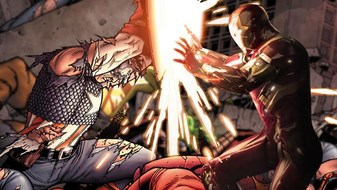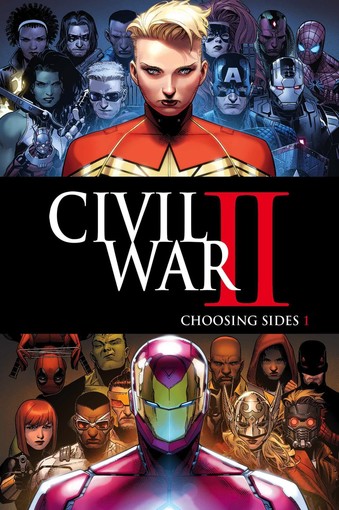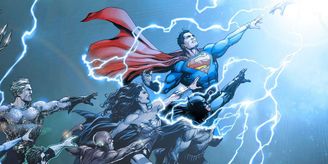Written by Joel T. Lewis How do you take a community that takes so much pride in its members knowledge of obscure and universe spanning trivia and make it more alienating to newcomers? A strong argument could be made that large Comic Book Events do just that. Typically, the implications of massive multi-series story arcs like Flashpoint, Infinite Crisis, Civil War, or the more recent Secret Empire are major universe/continuity shake-ups. By definition, shaking up a narrative as multifaceted as a comic book universe doesn’t encourage newcomers to jump on board, especially when the shake-up can span anywhere from 10-20 comic book titles. The problems that arise, even for veteran comic book readers are several and varied. The cost of keeping up with every issue of a comic book event alone is enough to discourage even hard core fans from following along. For example, the last Marvel event, Civil War II spanned just over 40 titles across the Marvel Universe with each series contributing 2-5 issues a piece. At $3.99 a pop (and usually large event specific titles like the 7 issues of Civil War II jump to $4.99) the financial burden of following every aspect of that storyline is staggering! Even if you can swing the cover price for all those series for the duration of the event, keeping track of the timeline of events in a massive event can be tedious and frustrating. Even within the Marvel Unlimited Subscription App I’ve had multiple suggested reading orders for the same comic book event, which is infinitely frustrating because you constantly feel like you’re back tracking. Also, as the comic book industry has discovered how profitable these large events can be they are happening more and more frequently. So it doesn’t matter if you’ve finally gotten a grasp on the new baseline for a universe following Civil War II for example, because Secret Empire has started and shook up the continuity again. The looming possibility of another cataclysmic event doesn’t inspire any confidence in the integrity of a character or team’s make up because there’s no guarantee that they’ll be given the space to grow given the developments of the previous event. So imagine trying to pick up comics for the first time in the midst of a major event. Suddenly you can’t just buy the latest issue of Captain Marvel and pick up the story, you have to buy the 8 issues before that, plus all the Marvel titles that tie in and hope you pull enough of the threads together to fill in the gaps of the issues you missed. Now you’re broke, lost, and what was supposed to be fun has now become a chore. So, as I have faced down the daunting notion of the Comic Book Event myself I thought I would write up a guide for how to navigate what has become a big part of modern comic bookery. Reading an Event that has Already Occurred  Make a list, shop for trades, and don’t be afraid to be selective about what you read. Approaching an event that has already been released in full puts you in the best possible position to track down every aspect of the storyline, or pick and choose from trade paperbacks. The first step is finding a complete reading list for the event you want to read. Unfortunately, the DC and Marvel Websites are not as comprehensive or accessible as is necessary to compile a suggested reading list. If you have a Marvel Unlimited Subscription, the lists and suggested reading orders that you have access to through the browse feature of your app or online, while a bit nebulous, are very comprehensive. I research different comic events through ComicVine.com’s search function. Be sure when using this search that you click on the 'Story Arc' results in order to see all the issues included in the event. Also, to avoid spoilers, when you reach the story arc page, scroll all the way to the bottom to the Issues section. This will give you a pretty thorough list of all the titles that tie-in to the event in chronological order and show you every issue’s cover art so that they’re easy to track down individually. Now, when deciding where to spend your time within a given story arc there are a couple of different options: The quickest and cheapest way to get the general idea of a big story arc is to read the title series. There are 110 individual tie-in issues that make up the Marvel Civil War Event, but there are only 7 issues of the Civil War title series that give you the basic plot points without a huge investment of time or money. These are pretty easy to track down in Trade format and are a great way to absorb the bullet points of an event without going blind from reading. Another option is to trace characters you’re already invested in throughout the event. Picking up all of the Wolverine: Civil War issues either individually or in trade for example, gives you a focused and self-contained storyline that occurs within the scope of the larger event but without the noise or confusion inherent in following so many storylines all at once. Also, don’t let the stress of a universe spanning event keep you from continuing a series you like. I discovered recently that the Marvel titles I was already following (Power Man and Iron Fist, Totally Awesome Hulk, and Mighty Thor) which all tied in with the Civil War II event (which, to be honest, I wasn’t that interested in) were self-contained and interesting enough that their involvement in the larger narrative didn't ruin or upset what I enjoyed about those titles. In fact, the issues of those titles that tied-in with the Civil War II event were really interesting and I was glad to have read them. Unless you have the funds, time, and interest, don’t feel like you must read everything! There is no shame in skipping a stretch of the arc if you have no interest in the characters that star in that section of the story. If you have no interest in Suicide Squad, Heroes for Hire, or Ghost Rider, skipping those threads isn’t going to cripple the impact of the larger narrative, and if there happens to be a reference to the events of those arcs that you skipped, you can always back-track to fill in the gaps with an issue or two. Reading an Event as it Comes Out  Budget early and strictly, branch out from the Main Event title slowly, and don't be afraid to drop a title that stops interesting you. If you are dead set on following a Large Comic Event as it comes out your budget is key. Again, don't feel obligated to buy every tie-in title. Focus on the main series title first and build out slowly in the direction of characters you are already invested in. Look for creative teams you are familiar with from previous series or cover art that grabs you. Also, at the end of most modern tie-in comics there will be suggestions for what series to pick up next. Use these ads to determine how far down the rabbit hole you'd like to tumble. Also, don't be afraid to abandon a tie-in series if you don't like where it's going! Too often I find myself limping along with a series I'm not that invested in just for the sake of completing the event. Don't do that to yourself. With Denver Comic Con rapidly approaching and comic book events like DC’s Rebirth and Marvel’s Secret Empire going right now, it’s a great time to look into starting a Comic Book Event. I hope this article made the process seem a bit less daunting and I would love to hear if you have any strategies that might help me the next time I dive into a new one! Until next time, Geek On!
0 Comments
Leave a Reply. |
Archives
May 2024
|
|
© 2012-2025, Nerds That Geek LLC.
All Rights Reserved. |
uWeb Hosting by FatCow
